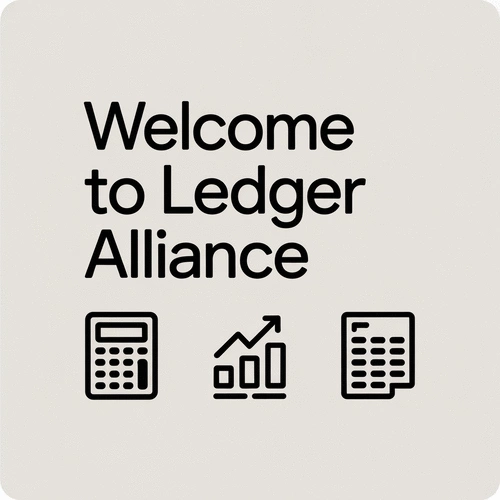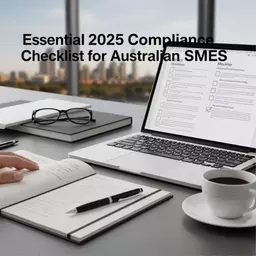What will business compliance look like for Australian SMEs in 2025? As regulations evolve, understanding compliance becomes essential for safeguarding your enterprise. Here’s what you’ll learn about navigating this complex landscape.
What You Will Learn
- The definition of business compliance and its importance for SMEs in maintaining legal and ethical operations.
- Key compliance challenges facing Australian SMEs in 2025, including tax legislation changes and employment laws.
- The pivotal role of the Australian Taxation Office (ATO) in regulating compliance and providing guidance for businesses.
- Practical steps to implement a compliance checklist tailored to your business size and industry.
- The significance of fostering a compliance-driven culture within your SME through effective leadership and employee engagement.
- Resources for seeking professional guidance on compliance, including websites and industry associations.
Key Compliance Challenges & Solutions for Australian SMEs (2025)
This visual outlines the primary compliance challenges faced by Australian SMEs in 2025 and practical steps to address them, ensuring business readiness and growth.
Challenges for Australian SMEs
- ✖ Adapting to changes in tax legislation
- ✖ Staying updated on employment laws
- ✖ Ensuring data protection in the digital landscape
Actionable Steps for Compliance
- ✔ Assess current compliance status & identify gaps
- ✔ Customize checklist based on industry & business size
- ✔ Set clear deadlines for each compliance task
- ✔ Involve your team in compliance efforts
Guidance & Resources
- → Business.gov.au for resources
- → Join relevant Industry Associations
- → Consult with accounting professionals (e.g., Ledger Alliance)
Fostering a Compliance Culture
- ✓ Leadership by Example: Adhere to regulations
- ✓ Communicate Openly: Discuss challenges
- ✓ Recognize Compliance Efforts: Reward employees
- ✓ Training Programs: Educate on superannuation, rights, updates
Understanding Business Compliance for Australian SMEs in 2025
As a small to medium enterprise (SME) owner in Australia, it's crucial to grasp the concept of business compliance and its significance. Compliance refers to adhering to laws, regulations, and guidelines that govern business operations. For SMEs, understanding these requirements is essential, as it not only fosters a trustworthy reputation but also safeguards against potential legal issues that could jeopardize your business's future.
In 2025, navigating compliance will likely be even more complex due to evolving regulations and heightened scrutiny from governing bodies like the Australian Taxation Office (ATO). As part of my mission at Ledger Alliance, I aim to empower SMEs with the knowledge needed to stay compliant and thrive.
What Is Business Compliance and Why Is It Essential for SMEs?
Business compliance encompasses various requirements that a company must meet to operate legally and ethically. This includes financial regulations, workplace safety standards, and consumer protection laws. For SMEs, compliance is vital for several reasons:
- Maintains trust with customers and stakeholders
- Avoids costly fines and penalties
- Enhances operational efficiency and risk management
By ensuring compliance, SMEs can focus on growth and innovation instead of worrying about potential legal ramifications. I often remind my clients that compliance isn't just a box to check; it's a fundamental part of running a successful business!
Key Compliance Challenges Facing Australian Small Businesses in 2025
As we look ahead to 2025, there are numerous compliance challenges that Australian SMEs will face. Staying informed about these hurdles is essential for proactive management. Some of the key challenges include:
- Adapting to changes in tax legislation, which can be further explored through resources like Business.gov.au's updates on changes for businesses from 1 July 2025.
- Staying updated on employment laws.
- Ensuring data protection in the digital landscape.
These challenges can seem daunting, but with the right strategies and resources, SMEs can navigate them effectively. At Ledger Alliance, we’re dedicated to providing the insights necessary for you to stay ahead of the curve!
Understanding the Role of the Australian Taxation Office (ATO)
The ATO plays a pivotal role in regulating compliance for businesses in Australia. They enforce tax laws, conduct audits, and provide guidance to ensure that businesses meet their obligations. For SMEs, understanding the ATO's requirements is crucial to avoid penalties and maintain a good standing. Regularly reviewing your tax compliance status can drastically reduce stress, especially as deadlines approach. Additional information on payroll compliance and other obligations can be found on the ATO's business section. Remember, knowledge is your best ally in the world of compliance!
In the upcoming sections, we will explore essential legal documents and tax compliance requirements that every SME should be aware of to ensure a smooth operation in 2025.
Pro Tip
Did you know? Implementing a digital compliance management system can significantly streamline your processes. By automating compliance tasks and tracking deadlines, you can reduce manual errors and ensure that your business stays ahead of regulatory changes. This proactive approach not only saves time but also enhances your team's ability to focus on strategic growth initiatives.
Taking Action for Successful Compliance in 2025
As we gear up for 2025, it’s crucial for small to medium enterprises (SMEs) like yours to actively implement effective compliance strategies. This isn't just about ticking boxes; it's about laying a strong foundation for your business. Adopting a comprehensive compliance checklist can ensure that you’re not only meeting regulatory requirements but also fostering trust with your customers and stakeholders. Ready to take the next steps? Let's dive in!
Here are some practical steps to help you implement your compliance checklist:
- Assess Your Current Compliance Status: Evaluate where you stand in terms of existing compliance measures and identify gaps.
- Customize Your Compliance Checklist: Tailor your checklist based on specific industry requirements and your business size.
- Set Clear Deadlines: Create timelines for each compliance task to keep your team accountable and on track.
- Involve Your Team: Ensure that all employees understand their roles in maintaining compliance.
By following these steps, you can enhance your compliance processes and ensure your SME is well-prepared for the challenges that 2025 presents.
Where to Seek Professional Guidance and Resources
Seeking professional guidance is essential when navigating the complexities of compliance. Resources are available that can provide the expertise and insights needed to ensure your strategies are effective. As someone who is deeply invested in the financial success of SMEs through Ledger Alliance, I recommend utilizing trusted resources tailored to your needs.
- Business.gov.au: This platform offers a wealth of resources on compliance requirements, regulations, and best practices tailored specifically for Australian businesses. For example, you can find information about changes for businesses from 1 July 2025.
- Industry Associations: Joining relevant industry associations can provide access to networking opportunities, workshops, and tailored compliance resources.
- Consulting with Experts: Don't hesitate to engage with accounting professionals like myself at Ledger Alliance, who can offer personalized guidance and support.
With the right resources, your path to compliance can be clearer and more manageable, allowing you to focus on what you do best—growing your business!
Encouraging a Compliance-Driven Culture within Your SME
Creating a compliance-driven culture is about more than just following rules; it's about embedding compliance into the very fabric of your business. Leadership plays a crucial role in setting this tone. When leaders prioritize compliance and demonstrate its importance, it encourages the entire team to embrace it as a shared responsibility.
The Importance of Leadership in Compliance Management
As a leader, your actions and decisions have a profound impact on your team’s approach to compliance. Here are some ways you can champion compliance within your SME:
- Lead by Example: Show your commitment to compliance by adhering to regulations and standards yourself. This aligns with broader governmental expectations for ethical conduct, as outlined in documents such as the Commonwealth Procurement Rules Appendix.
- Communicate Openly: Foster a culture of transparency where team members feel comfortable discussing compliance challenges and asking questions.
- Recognize Compliance Efforts: Acknowledge and reward employees who actively participate in compliance initiatives.
By embracing these practices, you can cultivate an environment where compliance is seen as a shared goal rather than a burdensome obligation.
Fostering Employee Awareness and Engagement with Compliance Practices
Engaging employees in compliance practices not only enhances understanding but also promotes accountability. One effective way to achieve this is through training programs tailored to their specific roles and obligations.
Training Programs on Employee Superannuation Obligations and Rights
Consider implementing training programs that cover essential topics, including employee superannuation obligations. This not only educates your workforce about their rights but also ensures compliance with regulatory requirements. Here are some training aspects to include:
- Understanding Superannuation Contributions: Provide insights into how superannuation works and its importance for employees.
- Rights and Responsibilities: Educate employees on their rights regarding superannuation, including access to information and how to manage their accounts.
- Regular Updates: Conduct periodic training sessions to keep everyone informed about changes in legislation and compliance standards. Information on payroll compliance from the ATO can be a valuable resource for developing these programs.
By fostering an informed and engaged workforce, your SME can navigate compliance challenges more effectively while building a culture of trust and integrity.
Frequently Asked Questions (FAQs)
- What is business compliance for Australian SMEs?
- Business compliance involves adhering to all relevant laws, regulations, and guidelines governing business operations in Australia. For SMEs, this includes financial regulations, workplace safety, tax laws, and consumer protection, ensuring legal and ethical operations.
- What are the key compliance challenges Australian SMEs will face in 2025?
- Key challenges include adapting to changes in tax legislation, staying updated on evolving employment laws, and ensuring robust data protection in an increasingly digital environment.
- How does the ATO contribute to business compliance?
- The Australian Taxation Office (ATO) is crucial for regulating compliance by enforcing tax laws, conducting audits, and providing guidance to businesses to help them meet their tax obligations and avoid penalties.
- What are practical steps SMEs can take to implement a compliance checklist?
- Practical steps include assessing your current compliance status to identify gaps, customizing a checklist for your specific industry and business size, setting clear deadlines for each task, and involving your team in compliance efforts.
- Why is fostering a compliance-driven culture important for an SME?
- A compliance-driven culture, led by example and open communication, embeds compliance into daily operations. It encourages employees to take shared responsibility, enhances trust with stakeholders, and helps avoid legal issues, ultimately supporting business growth and stability.
Recap of Key Points
Here is a quick recap of the important points discussed in the article:
- Understanding business compliance is crucial for Australian SMEs to maintain trust and avoid legal issues.
- Key compliance challenges for 2025 include adapting to tax legislation, employment laws, and data protection.
- Establishing a compliance-driven culture requires leadership, open communication, and employee engagement.
- Practical steps for compliance include assessing current status, customizing checklists, and setting clear deadlines.
- Utilize resources like Business.gov.au and industry associations for expert guidance and support.








